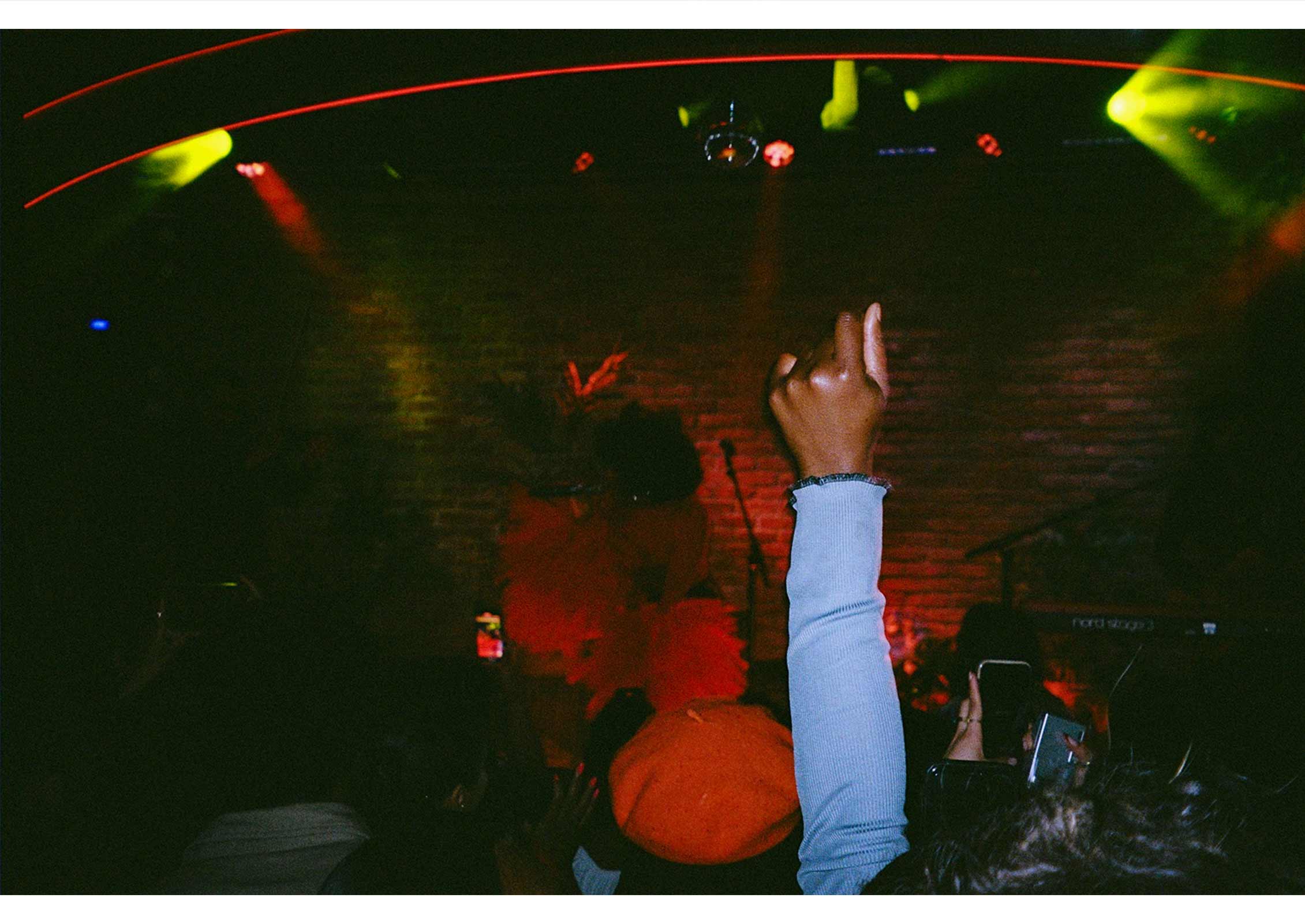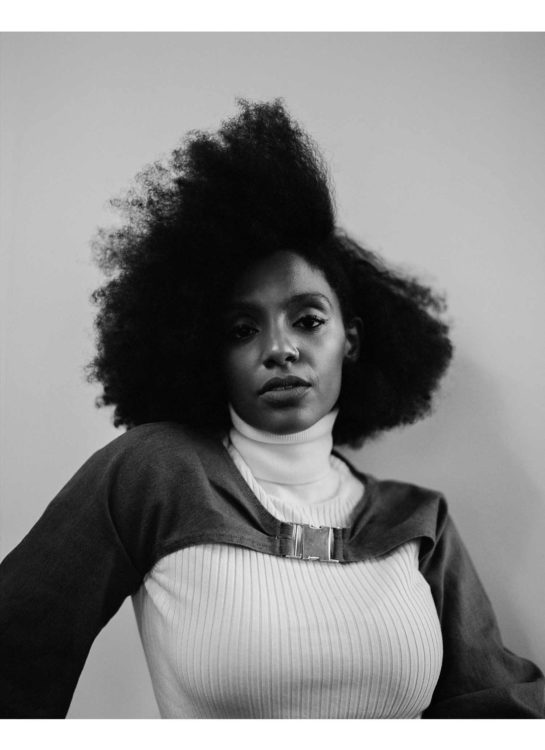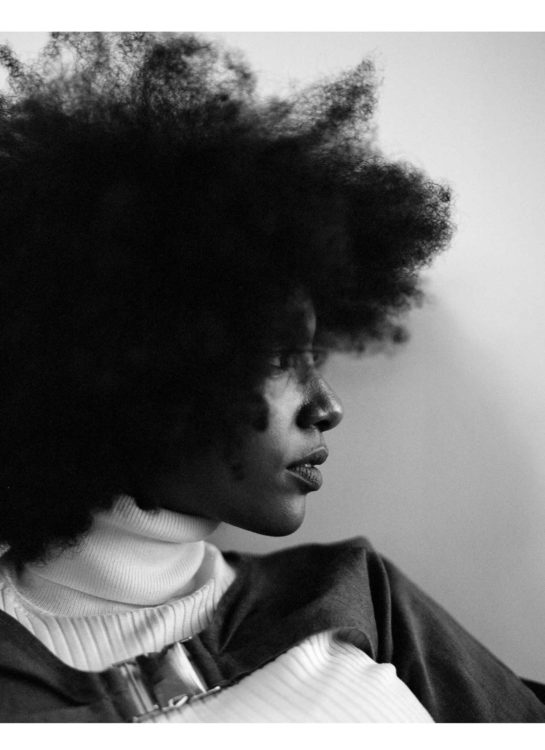- Words Damola Oladapo
- Photography Cassian Gray
Multi-hyphenate Mereba, fresh off a headlining show at Lafayette, chats to Notion about her latest EP, African-American identity and the influence of Stevie Wonder.

The massive influence of neo-soul in modern R’n’B has seen the word “ethereal” attached to any artist whose music and/or image may carry a spiritual feel to it. Alabama-born singer-songwriter-producer Mereba is indeed ethereal, but it’s more the actual ether that encircles her which is more deserving of intrigue. The force field that emanated from her superb 2019 debut album ‘The Jungle Is The Only Way Out’ smokily bristled throughout its 13-tracks with consistently clever production and a wry smile-through-the-pain fury in her writing.
The album explored themes of Black identity, racial inequality, lost love and grief but it’s crafted in a way that requires you to listen properly to catch the minutiae of her expression. But these layers haven’t stopped songs like “Black Truck”, “Sandstorm” (featuring her good friend J.I.D) and “Stay Tru” from becoming hits; they’ve amassed millions of plays/views while earning Mereba legions of fans across the globe, too.
When Mereba’s latest project ‘AZEB’ dropped in 2021, it came at a point during the pandemic when collective fatigue had long set in. The artwork was an immediate sign of a new musical shift. It was much lighter, freer. A carefully crafted, hopeful tonic to the gloomy times. This was by design. The lilting, lullaby-inspired melody on the standout track ‘’Rider’’ is tonally, very distant from anything found in the enigmatic jungle of ‘Jungle’.
Behind this, maybe, is the fact that 2021 saw Mereba become a mother. It’s safe to say a lot has changed for her in just a few years. Ahead of her very first headline show in London, we sat down to speak about her journey so far, her heritage, Stevie Wonder’s mentorship and whether we’ll get a full-blown rap project from her soon.


Back to touring for the first time since the pandemic and having a child. How does it feel?
Amazing! I’ve missed performing so much. But you know it’s like a muscle memory coming back and feeling like “OH I do this thing ok I can do this.” It’s just the best feeling knowing that it’s an option again.
This is the first time you’re playing your new tracks live, right? What’s that been like for you?
Yeah! To actual people in front of me and not a screen. “Rider” is a really fun song to perform because it’s more dancy, you know. So that’s cool, but it’s one of those things where you have to just get up there and perform to know the vibe. Usually, with new music, you can test it live when performing. You can pull up like oh I have a new song I’m going to show you guys. But, cause of the pandemic, I couldn’t do that. So it’s just diving straight into shows and doing new songs. It’s been interesting. Especially doing them in Europe where a lot of the countries we’ve been to don’t speak English that fluently. So I’m here trying to test songs that are very deep lyrically and they’re like looking at me like ‘’huh?’’ and you’re like “Ok ima play one that’s more dancy”.
I hear that! Your latest EP, firstly it feels a lot lighter than ‘Jungle’ did. What was the driving force behind it? It’s a name in Ethiopian, right, I’m assuming it’s your child’s name?
No, it’s my middle name actually. I didn’t know what my name really meant. I mean, sure, my dad told me but I needed a second opinion because my dad was very jokey and whimsical. He said it meant Southern Star and then, I found out it means where the sun rises! So if people are journeying, it’s like a star, a direction, Azeb. Kind of like the North Star that we have in America. But the vibes on ‘AZEB’, the project, was just a reflection of where I was in 2020. Outside of what was happening with covid etc. But on the inside, I felt very light and very peaceful, so I wanted to channel that energy out into the world as I felt we were lacking that energy collectively.
So it was more just a moment you wanted to share with other people – a pure artistic expression?
Yeah definitely. Just to help people find little reasons in life to just keep going and keep working at it. I feel like happiness is fleeting in life. And, I don’t think that happiness is the only emotion I want to seek in life. I want the full range of emotions. It seemed that collectively, the world, we were just all going through a certain period that was challenging but on the other side was a joy that you couldn’t have truly processed without that initial struggle, feel me? This overwhelming joy like “oh my, I can literally just go outside, without a mask on” and “I can meet up with my friends, without being afraid,”. Whatever it is to you. Surrendering to uncertainty was a big theme for the project, yeah.


The melody of “Rider” sounds like a lullaby. Was that where the idea came from?
I think a lot of my melodies have a lullaby vibe to them. I didn’t really notice it until listening back to it with some time between making it and listening back. So yeah it is kind of like a lullaby, with a little drum beat behind it.
So, you’re a self taught pianist and guitarist. Is that right?
Umm yeah, piano is iffy for me but I can get by. But I prefer playing the guitar.
I read Stevie Wonder encouraged you to keep producing your own music. You’ve described him as your ‘’Fairy Godfather’’. How big of an influence was he on your whole process?
First of all he was a huge influence on me musically because that’s my mum’s favourite artist. So growing up I would listen to Stevie with my mum. It was a full circle thing for him to come into my life at the time he did because I was really discouraged with music, with the music industry, to be specific. He came in and just encouraged me to do what I was already doing. So it wasn’t like things changed, but when I was starting to doubt my path he came and inspired me to keep going down that path, which is what I needed to hear at that exact time. Which is how alignment works, you know. So I just kept making my music and finding people that believed in what I was trying to do and he was a big cheerleader for me.
The best vocalists know how to use their voices as instruments in their own right. You’re excellent at this. Because you produce as well, does your experience as a producer affect how you sing and how you construct your own vocals?
Definitely. Yeah. It’s like you can really really really develop your own sound when you’re producing your own music. Every single element of it you’re controlling, so if you want it to feel more poignant or emotional you’re gonna do things production-wise and then with your voice that can match it. So it helped me tap into my vocal style more by producing, for sure.

So, listen, you haven’t collaborated with any UK artists…
You said I haven’t?
Yeah…
Wrong! Kojey Radical, 2020 Pandemic year. Tappp in. And CKTRL.
OK, well, that kinda spins the question! Basically, where I was gonna land is, I want you to collaborate with Pa Salieu. I think your styles would blend well together. It’s more the way he’s unapologetically Gambian, African in the same way you celebrate your Ethiopian roots.
Got you. It’s a huge part of my music and an even bigger part of myself.
Because a lot of people in the States specifically are beginning to remember that before we were African, before we became ‘Black’. And that’s one of the things I love most about your music, your whole vibe, you’re very much from the continent, you rep that properly. What do you feel about the new conscience that’s developing among African-Americans?
I’m so glad you say that because I see it everyday in life and I’m really proud. ‘Cause I grew up half African-American and half Ethiopian so I understand both perspectives, I understand what not knowing your roots can do to you. How you may feel like you’re floating, like you may feel as if you don’t have a home. I’m so proud to see people wanting to learn about where they came from. I’m so proud to see my brothers and sisters boarding planes and going to Africa.
Getting passports as well.
Getting passports. My mum just got a passport a few years ago because I took her to Ethiopia. She has two half Ethiopian children and she’s never been. It’s a common thing in America.
It’s a control thing in America – them making it so difficult?
Yeah and it’s more like a public education thing, like we don’t learn about the rest of the world and if we do it’s usually negative. Like when I would tell my friends I’m gonna go back home to Ethiopia they’re like “errrgh”. You know? It’s like a reprogramming that we all have to go through, you know. But I’m really excited because I feel like a big shift is happening.

You and JID obviously have a very special connection, and are very good friends as well. What’s behind it? Was it friendship first or music first?
Yes, well we met through our music community in Atlanta, through EARTHGANG. But, he’s my brother. My long lost brother. It’s a very kindred bond. When we make music together it’s so effortless, so pure, so genuine. It’s special. Yeah we met through music and then we actually became friends. Really good friends. We were friends long before we were artists that anybody knew. That’s why it’s such a natural connect.
You spazzed on Planet You. We need that solo rap tune. Serious bars. We need that solo rap tune. When’s it coming?
Yeah, I mean, I definitely need to get on that. Don’t worry, I will release some more bars very soon.
Your flow was very Andre 3000-esque on that and obviously I know Atlanta is your hometown. We all know it has a very rich musical tapestry. How has Atlanta shaped your sound?
Atlanta definitely encouraged me to blend rapping with what I was already doing melodically. Like you said that Rider has a kind of lullaby vibe to it, and I do have that to my music, but at the same time I also have this very hard, you know, like rapper alter ego thing. Cause man, I came up with some of the best rappers in the game you know? I came up rapping next to my cousins and though they may not be artists for a living – the bar was high. There was a Zero Whackness Policy. So whenever I said ‘’I wanna rap’’ and it’d be the most basic dumb rap and they’d roast me. So being in Atlanta with my family and then my rapper friends were taking it seriously, so it just made me step my pen up. Atlanta is a very distinct city in America. It’s loud, potent, it’s alive. It’s a bit like the motherland because there’s so many black people. It’s always inspired me to keep my work colourful.
Now I’m gonna go back in time a bit to your first album. I think you studied English right?
I did.
Makes sense. ‘The Jungle is the Only Way Out’, it kind of felt like Southern Gothic literature in sonic form. If I was remaking To Kill a Mockingbird I’d definitely shout you for the score because you properly weaved those country influences into it. How did mixing genres help you tell the story?
That country folky vibe – you’re West African – right? Do you know what a Griat is? It’s a person that would travel from town to town in West Africa keeping oral literature alive. Telling stories of the last village you were at, keeping this culture moving through by telling your people stories. I feel like that’s what I’m here to be. Like a Griat. I was blessed to know my identity from a very young age and I’m proud of it. Now I feel like it’s my job to tell honest stories back to my people. To make them feel accepted. We are all going through this jungle and here are some songs to leave some footprints for you to follow and maybe make your journey a little easier. The country/folk element comes from being a storyteller.


You were on the Queen and Slim soundtrack – would you ever consider making film scores?
Yes, I would love to do it. Thanks for planting that seed.
I interviewed JID a couple months ago and the film talk opened up the conversation.
Yeah he loves films. I love books. I live in my own little imagination land. I fall asleep in movies, I’m sorry, I do.
Favourite producers, other than yourself, of course?
My main collaborators, Sam and Chris. I love working with them cos they’re super musical, they have sensibilities that and they love kinda the same range of music that I love.
Second last question – producer you would love to work with now if you could choose?
Hmm, Rafael Saadiq. And Q-Tip.
Yeah, we need you on the Last Zulu (Q-Tip’s long-awaited new solo record). Absolute pleasure talking to you.
Thank you so much.


